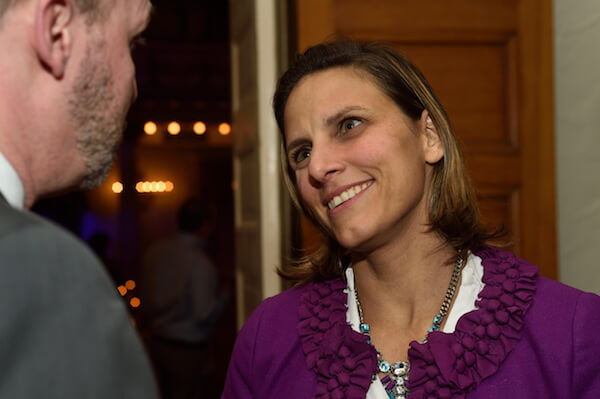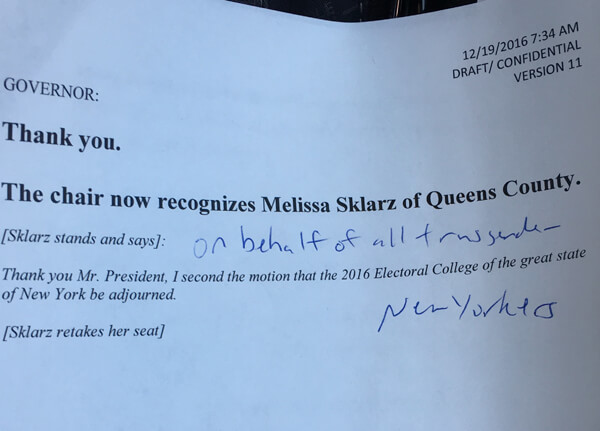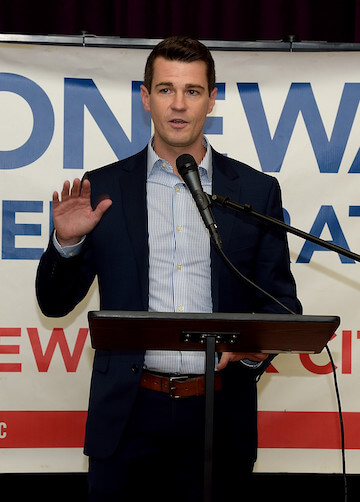Nathan Schaefer, the Pride Agenda's new executive director, addresses the tasks ahead in the group's Manhattan office. | GAY CITY NEWS
Eighteen months after New York joined an elite group of states that have legalized marriage equality and less than 30 days after what he called “a very exciting election,” Nathan Schaefer faces a path that in critical respects is largely uncharted as he assumes the leadership of the Empire State Pride Agenda (ESPA).
New York is the largest of the nine states that currently give same-sex couples equality in civil marriage, but it is behind 16 states and the District of Columbia in affording nondiscrimination protections to its transgender and other gender-nonconforming residents. Ten years have elapsed since a gay rights law was enacted in Albany, and ESPA now cites passage of the Gender Expression Non-Discrimination Act, or GENDA, as its top priority.
Other major challenges face the group as well.
Homelessness among LGBT youth continues to defy a solution in New York City, with up to 40 percent of the estimated 3,800 young people living on the streets on any given night self-identifying as queer. The City Council engages in an annual duel with the Bloomberg administration to restore cuts in homeless youth services proposed in the mayor’s executive budget, while the first budget out of Governor Andrew Cuomo after he took office in early 2011 slashed spending in that area by 50 percent. Advocates say there are a mere 250 shelter beds funded by government available to homeless youth in the city, with perhaps another 100 paid for from other sources.
Whatever the shortfall in resources for youth, there is substantially less public and community attention to the emerging needs of an exploding population of out LGBT seniors. The Pride Agenda coordinates a state network of more than 50 health and human service organizations that serve an estimated 800,000 LGBT New Yorkers annually, but while the group has been able to maintain funding out of the governor’s budget at more than $5 million in recent years — despite the Great Recession — additional allocations from the State Senate and Assembly, which totaled more than 3.5 million in 2009, went away when so-called member items were eliminated.
ESPA also has responsibility for monitoring implementation of legislation previously enacted. One example is the rollout of the Dignity for All Students ant-bullying measure that was passed in 2010 — and amended this year to include cyberbullying — but is only now coming online.
All this is a tall order, especially for a group that some in the community no doubt believe has already achieved its most important goal. Schaefer, however, betrays no sense that he sees his role as that of caretaker over a group whose biggest victory is behind it.
In a mid-November interview, asked how his first month in the job had gone, the 31-year-old former public policy director at the Gay Men’s Health Crisis responded, “Very good. It has certainly been overwhelming, but also exciting and thrilling. And I’ve gotten great support, from the staff, and from the board, and from people across the state.”
The week before, Schaefer had toured Syracuse, Rochester, and Buffalo, in a trip that included a visit with the parents of a transgender son.
“I can’t tell you enough about their interest and enthusiasm” for ESPA’s work, he said. The story those parents shared, he explained, is an important part of the group’s efforts to emphasize to legislators looking at GENDA “who it affects.”
There is no question, however, that Schaefer faces the tasks ahead with more limited resources. He said that the group’s fall dinner in Manhattan exceeded its roughly $1 million fundraising goal, but acknowledged its planners aimed lower than the “unprecedented” affair held in 2011, when the marriage victory was still fresh. Louis A. Bradbury, ESPA’s board chair, speaking at a November 28 event where the group’s strategic priorities through 2015 were outlined, said the current budget is about ten percent down from last year’s.
There are more than a few ironies in the fact that success on the marquee issue of gay marriage would constrain fundraising at ESPA, not least of which is that married same-sex couples in New York are still denied every single benefit of marriage available under federal law — an inequality that involves the most important considerations, including IRS tax filing, inheritance rights, and Social Security survivor benefits.
For that reason, perhaps more than any other, ESPA is exploring options for moving beyond its traditional exclusive focus on state and municipal level advocacy into work on the federal level. Both Schaefer and board co-chair Norman C. Simon, at the November 28 strategic priorities gathering, talked about how an extensive outreach effort the group recently undertook — that involved Internet surveys and focus groups, as well as individual interviews with donors and community leaders — uncovered support for ESPA striking out in this direction.
“We don’t know exactly what this looks like,” Schaefer said on November 28, though he indicated it would likely begin with an exploration of how to work with New York’s congressional delegation, in which Democrats and Republicans alike now represent a state with thousands of same-sex married couples denied federal recognition.
“There is the opportunity, and the time is now,” Schaefer told Gay City News earlier in the month about the challenges his group could tackle in Washington. “We now have access to thousands of married couples, and they and we have stories to tell.”
A big part of the role Schaefer clearly believes ESPA can play is in “demonstrating the need” these couples have for righting the wrong of the federal Defense of Marriage Act. Acknowledging that the group has not explored what federal government resources could be generated to support homeless LGBT youth, he said much the same tack — documenting the unmet need — could be taken in advocating on that issue in Washington.
And, of course, the lack of a transgender civil rights law in New York — along with the absence of any protections for the LGBT communities in more than half the states — provides an urgent need for action in Washington on the long-stalled Employment Non-Discrimination Act and on a potential executive order from President Barack Obama barring anti-LGBT job bias by federal government contractors.
For ESPA, though, the most pressing case to be made is on behalf of GENDA. At an October 24 state legislative hearing held in Lower Manhattan, the Pride Agenda and other advocates, including the Transgender Legal Defense and Education Fund and the National Gay and Lesbian Task Force, spelled out stark statistics documenting the realities of transgender life — on-the-job harassment of up to three-quarters of the community and discriminatory firings affecting 20 percent, homelessness experienced by two out of three transgender New Yorkers at some point in their life, physical or sexual assault inflicted on up to a third of the population, and attempted suicide rates 25 times the national average.
The legal landscape for New York’s transgender community, however, is not uniform. With the recent enactment of a civil rights ordinance in Syracuse, the state’s most populated cities — including New York, Buffalo, Rochester, Albany, Binghamton, and Ithaca — all provide protections based on gender identity and expression, as do Westchester, Suffolk, and Tompkins Counties. But as ESPA’s transgender rights organizer, Christopher Argyros, pointed out, a resident of Suffolk County who works in Nassau County has housing protection but not employment protection. The same could be said of Westchester and Rockland Counties, Albany and Troy, or Buffalo and Niagara Falls.
One of the ways ESPA hopes to demonstrate the need for GENDA in more personal terms is through its TRANScribe Story Project, in which members of the trans community — and their partners, families, friends, coworkers, bosses, and clergy — write about their experiences and how the lack of legal protections, economic opportunities, healthcare resources, and basic personal safety affects their lives. The group will use these stories in its annual Equality and Justice Day lobbying push next spring, when it presses the State Senate to finally allow a floor vote on the measure, which has been approved numerous times by the Assembly.
In 2010, GENDA got as far as the Judiciary Committee, where it was expected to be approved based on the private assurances of several Republicans. As the hearing came to a close, however, GOP senators as a bloc joined Bronx Democrat Ruben Diaz, Sr., an implacable foe of the LGBT community, in preventing the measure from going to the Senate floor for a vote.
The most dispiriting moment in the hearing, however, came when a Democratic staffer, on hand to provide information helpful to the effort to pass the bill, responded to a typical opposition charge — that it would allow “men in dresses” to enter women’s bathrooms — by saying that such “men” would be at risk if they entered men’s bathrooms.
Advocates are determined to head off the canard that transgender civil rights imperil the privacy of women in settings like bathrooms by documenting that such complaints have simply not been heard. At the October legislative hearing, the police chiefs of Rochester and Albany stated unambiguously that local ordinances there had actually enhanced public safety. Suzanne Perry, a League of Women Voters official and a Republican, testified, “Those who fabricate these fears believe that women like me will respond to them. But they recognize them as ploys.”
Winning the substantive argument, however, is often not the key to success in Albany. Getting a floor vote — which requires the acquiescence of the majority party — is the real issue. Republicans have controlled the Senate for eight of the ten years since GENDA was first proposed. In the majority, they have never allowed a vote, and when Democrats led the Senate, they blocked action in the Judiciary Committee. Not a single Republican senator has publicly endorsed the measure.
With two State Senate races still unresolved, Democrats were nominally in a position to potentially snag a 33-30 majority in January. However, in an agreement announced on December 4, a group of five Democrats confirmed they have reached agreement with the Republicans to forge a coalition majority in which the GOP would be the predominant player. Incoming Brooklyn Democrat Simcha Felder had earlier announced his intention to also caucus with the Democrats.
Senator-elect Brad Hoylman, an out gay Manhattan Democrat who replaces Tom Duane in January, told Gay City News several weeks ago that Republican control of the Senate would imperil GENDA’s passage. Democrats in the group of five who cut the deal with the Republicans have not to date responded to Gay City News’ queries as to whether they raised the issue of GENDA in their negotiations.
At a November 27 City Hall rally, the Working Families Party, tenant activists, and labor leaders had made much the same warnings about a host of other progressive goals. A WFP spokesman acknowledged that nobody was slated to address GENDA at that rally, though he said an LGBT activist was on hand for a similar public event in Buffalo.
Explaining that “we, as a nonpartisan organization” cannot be part of the jockeying over control of the Senate, Schaefer, speaking weeks before the power-sharing deal was completed, said, “We will work with everyone. We have to work with everyone.”
Indeed, three of ESPA’s greatest achievements — the 2000 hate crimes law, the gay rights law in 2002, and the marriage equality victory in 2011 — all came while the Senate was in Republican hands. Democrats, however, provided the bulk of the votes — in 2011, 29 of the 33 that ensured victory.
As ESPA lobbies Republicans, one issue they will likely confront is the legacy of the marriage vote last year. As advocates pressed for GOP support in the Senate and Assembly in the years leading to marriage equality’s success, they consistently emphasized the importance of reelecting those who voted the right way.
However, of the four Republican senators who voted yes, only freshman Mark Grisanti of Buffalo is guaranteed of returning to Albany in January. Rochester’s Jim Alesi bowed out of his reelection race in the face of an expected primary challenge from an anti-equality Assembly Republican. Roy McDonald, from Saratoga and Rensselaer Counties north of Albany, was defeated in the September 13 primary by a harsh critic of his marriage vote. And Stephen Saland, from the Lower Hudson Valley, was weakened in his primary by an anti-equality challenger, who stayed in the race on the Conservative line and may have handed the contest to a Democrat, in a race not yet officially called.
With the election of Sean Patrick Maloney, an out gay Democrat, in a congressional district that includes much of Saland’s State Senate district — not to mention the marriage equality victories in state ballots nationwide — Schaefer had reason to argue that the verdict out of the November 6 election was good for the LGBT community. But, like Freedom to Marry’s Evan Wolfson, who after the September primary told Gay City News that McDonald’s and Saland’s problems came in low-turnout GOP primaries, ESPA’s chief sidestepped a central problem raised by these races — that Republicans, in weighing whether to embrace LGBT issues, don’t worry about facing Democrats, they fear challenges from the right in their own party.
If ESPA faces tricky political terrain in Albany come January, however, the feedback the group got in its recent strategic review offers cause for reasonable optimism. More than three-quarters of those questioned online, in focus groups, and in personal interviews scored the group at seven out of ten or better on measures of political access and working with elected officials.
“That is our brand,” declared co-chair Norman C. Simon in the November 28 strategic overview meeting.
Taking a lead role in the implementation of pro-LGBT laws already enacted, serving as an “umbrella” group to coordinate efforts on behalf of LGBT youth, and working to grow the pie of social service funding for the community are natural directions for the group to move in, its surveys found.
Where ESPA’s stakeholders feel the group needs to do more are in the areas of communicating its mission and strategies, diversifying its base of supporters — in racial and ethnic, socioeconomic, age, and political affiliation terms — and lending its expertise to other organizations in the community.
Given these findings, it’s not surprising that Schaefer, in his first handful of public appearances, has repeated variations on a common theme. “I want to hear from all of you,” he said at the October fall dinner in Manhattan. “I need to be well-armed with your personal stories.”




































